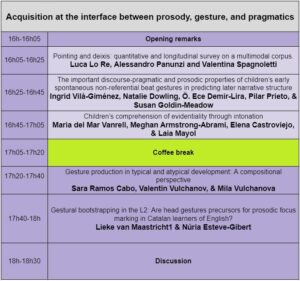Acquisition at the interface between prosody, gesture, and pragmatics
Organizers
Núria Esteve Gibert (Universitat Oberta de Catalunya)
Aoju Chen (Utrecht University)
Pilar Prieto (ICREA – Universitat Pompeu Fabra)
Summary description
Speakers use speech prosody to structure information in the discourse and to express their pragmatic intent (i.e. illocutionary force, epistemic stance, appropriate register, non-literality, turn-taking). Body gestures seem to serve parallel discourse and pragmatic functions, and they are temporally synchronized with prosodic structure. In development, the role of prosody has been studied mainly at early stages, where infants use their early sensitivity to prosodic features to parse words and phrases from the speech stream. Body gestures (like pointing gestures) are also found to be important in early communication, especially during the pre-lexical stage. Despite the common idea that prosody and body gestures are relevant in (and for) language development, we still lack a comprehensive description of how prosody and body gestures jointly work in the development of pragmatics, at various developmental stages, and with distinct populations.
In this workshop we intend to contribute to the discussion of how speech prosody and body gestures develop, and to the possibility that prosody and/or gestures are driving forces in language acquisition. Ultimately, present and future empirical evidence should be used to consider the potential inclusion of speech prosody and body gestures in language acquisition models.
Topics and areas of interest
- Infants’ and children’s use of prosody and/or body gestures in pragmatic development and, more broadly, in L1 and L2 language development
- The integration of prosody and gestures in populations with language and communication disorders
- Individual differences in infants’ and children’s use of prosody and/or gestures in language and communication
- The preceding and predicting value of speech prosody and/or body gestures in the development of other linguistic milestones, especially pragmatic milestones
- Cross-cultural differences in infants’ and children’s use of prosody and/or body gestures
Program

Registration
If you are interested in attending the workshop, please fill in this online form